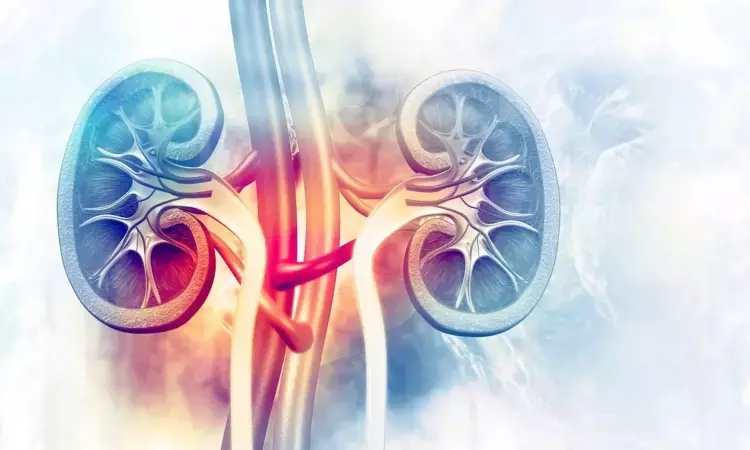- Home
- Medical news & Guidelines
- Anesthesiology
- Cardiology and CTVS
- Critical Care
- Dentistry
- Dermatology
- Diabetes and Endocrinology
- ENT
- Gastroenterology
- Medicine
- Nephrology
- Neurology
- Obstretics-Gynaecology
- Oncology
- Ophthalmology
- Orthopaedics
- Pediatrics-Neonatology
- Psychiatry
- Pulmonology
- Radiology
- Surgery
- Urology
- Laboratory Medicine
- Diet
- Nursing
- Paramedical
- Physiotherapy
- Health news
- Fact Check
- Bone Health Fact Check
- Brain Health Fact Check
- Cancer Related Fact Check
- Child Care Fact Check
- Dental and oral health fact check
- Diabetes and metabolic health fact check
- Diet and Nutrition Fact Check
- Eye and ENT Care Fact Check
- Fitness fact check
- Gut health fact check
- Heart health fact check
- Kidney health fact check
- Medical education fact check
- Men's health fact check
- Respiratory fact check
- Skin and hair care fact check
- Vaccine and Immunization fact check
- Women's health fact check
- AYUSH
- State News
- Andaman and Nicobar Islands
- Andhra Pradesh
- Arunachal Pradesh
- Assam
- Bihar
- Chandigarh
- Chattisgarh
- Dadra and Nagar Haveli
- Daman and Diu
- Delhi
- Goa
- Gujarat
- Haryana
- Himachal Pradesh
- Jammu & Kashmir
- Jharkhand
- Karnataka
- Kerala
- Ladakh
- Lakshadweep
- Madhya Pradesh
- Maharashtra
- Manipur
- Meghalaya
- Mizoram
- Nagaland
- Odisha
- Puducherry
- Punjab
- Rajasthan
- Sikkim
- Tamil Nadu
- Telangana
- Tripura
- Uttar Pradesh
- Uttrakhand
- West Bengal
- Medical Education
- Industry
Study identifies high BP and triglycerides as risk factors for IgA nephropathy

China: A recent Mendelian randomization (MR) study published in Frontiers in Medicine has shed light on the causal effect of high blood pressure (BP) and triglyceride (TG) on IgA nephropathy.
The study revealed high BP and triglyceride as risk factors causally connected with immunoglobulin A nephropathy (IgAN), of which high BP was strongly related to IgAN onset.
Results from previous research indicate that both TG and high BP have strong correlations with IgAN. However, there is no clarity if there is a direct causal effect of triglycerides and high blood pressure on IgAN.
High blood pressure and hyperlipidemia are common complications of renal dysfunction in IgAN. Although its exact cause is unknown, recent research indicates that high BP and triglycerides may play a causal role in IgAN.
Against the above background, Yijun Yan, First Affiliated Hospital of Xi’an Jiaotong University, Xi’an, China, and colleagues aimed to explore the causalities between HBP and TG, and IgAN based on MR analysis.
For this purpose, the researchers sourced from genome-wide association study (GWAS) summary data of IgAN (GCST90018866) and two exposure factors, TG (ukb-d-30870_raw) and HBP (ukb-a-437), from the GWAS Catalog and Integrative Epidemiology Unit (IEU) OpenGWAS databases, respectively.
Five methods were utilized to perform MR analysis after taking out single nucleotide polymorphisms (SNPs) as instrumental variables, including MR-Egger, weighted mode, weighted median, simple mode, and inverse variance weighted (IVW), followed by the sensitivity analysis containing the heterogeneity, horizontal pleiotropy test, and leave-one-out (LOO) analysis. Finally, the researchers performed the enrichment analysis and interaction network construction of genes corresponding to SNPs of high BP and TG.
The study led to the following findings:
- The univariate MR results revealed that high BP and TG regarded as risk factors were causally related to IgAN based on random-effect IVM method, of which TG had a weaker impact.
- The reliability of these univariate MR results was certified by the sensitivity analysis, in which there was no horizontal pleiotropy and exaggerated influence of each SNP.
- High BP was markedly causally related to IgAN with the help of multivariate MR analysis, rather than TG. Therefore, when HBP and TG occur simultaneously, HBP is a direct influencing factor on IgAN.
- A total of 208 and 153 genes separately corresponding to SNPs of TG and HBP were included in enrichment analysis, and thereinto, genes relevant to TG were mainly enriched in lipid homeostasis and cholesterol metabolism, while genes concerned with HBP played their roles in the regulation of cell growth, aldosterone synthesis and secretion and so forth.
In conclusion, the results showed a causal effect of triglyceride and high BP on IgAN, both of them are risk factors, and HBP is the direct influencing factor of IgAN.
"Since the sample data used in this study originated in East Asia and Europe, the causality currently applies only to these regions. Enrichment analysis of genes corresponding to SNPs of TG and high BP might spark interest in further molecular biological mechanism investigation in IgAN," the researchers wrote.
Reference:
Yang, Y., Li, Y., Feng, X., Ding, C., Zhang, J., & Liu, Z. (2024). The causal effect of triglyceride and high blood pressure on IgA nephropathy: A Mendelian randomization study. Frontiers in Medicine, 11, 1338462. https://doi.org/10.3389/fmed.2024.1338462
Dr Kamal Kant Kohli-MBBS, DTCD- a chest specialist with more than 30 years of practice and a flair for writing clinical articles, Dr Kamal Kant Kohli joined Medical Dialogues as a Chief Editor of Medical News. Besides writing articles, as an editor, he proofreads and verifies all the medical content published on Medical Dialogues including those coming from journals, studies,medical conferences,guidelines etc. Email: drkohli@medicaldialogues.in. Contact no. 011-43720751


